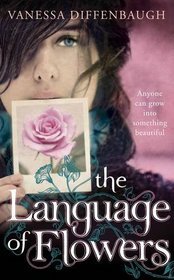
 For eight years I dreamed of fire. Trees ignited as I passed them; oceans burned. The sugary smoke settled in my hair as I slept, the scent like a cloud left on my pillow as I rose.
For eight years I dreamed of fire. Trees ignited as I passed them; oceans burned. The sugary smoke settled in my hair as I slept, the scent like a cloud left on my pillow as I rose."A mesmerizing, moving, and elegantly written debut novel, "The Language of Flowers" beautifully weaves past and present, creating a vivid portrait of an unforgettable woman whose gift for flowers helps her change the lives of others even as she struggles to overcome her own troubled past. The Victorian language of flowers was used to convey romantic expressions: honeysuckle for devotion, asters for patience, and red roses for love. But for Victoria Jones, it's been more useful in communicating grief, mistrust, and solitude. After a childhood spent in the foster-care system, she is unable to get close to anybody, and her only connection to the world is through flowers and their meanings. Now eighteen and emancipated from the system, Victoria has nowhere to go and sleeps in a public park, where she plants a small garden of her own. Soon a local florist discovers her talents, and Victoria realizes she has a gift for helping others through the flowers she chooses for them. But a mysterious vendor at the flower market has her questioning what's been missing in her life, and when she's forced to confront a painful secret from her past, she must decide whether it's worth risking everything for a second chance at happiness."
The Language of Flowers was a really interesting book. I loved it, though I didn't Love it. The whole concept that the book is based upon is so fascinating, the idea that flowers can have symbolic meanings. There is also a dictionary of the meanings in the back (at least in the UK edition, which I read and which is pictured on right). The characters in this one are also really, really amazingly portrayed, and the book can be so moving at times.
The Language of Flowers paints a sobering picture of what life as a foster child is like. I don't know if it's accurate or universal, but it was compelling. And certainly some aspects of it must be universal. Every other chapter is the story of when Victoria was nine and was with a foster parent named Elizabeth, and the things that happened there. The other chapters are set in the present day, when Victoria is eighteen and exchanging flower messages with the flower vendor.
The writing in this book is quietly beautiful, like the trillium, which apparently means modest beauty. I love trilliums, by the way. At any rate, the language of flowers and the language in this book was so great. I loved the concept, the plot, and the way it was executed.
I thought that this book looked interesting a while ago, but I didn't get around to it until now. I wish I had read it sooner. I learned a lot, was entertained, and was moved. I wanted to see what the terrible thing was that had happened, I wanted to learn more about Victoria, and I wanted her to be happy, to surmount her troubles.
There are so many different strands, so many different vines to this story, but it didn't feel thorny or forced. It felt right. The analogies relating to flowers worked, and this novel was really poignant. I would definitely recommend it. It's realistic fiction, I suppose.
390 pages, 4.5 stars.
No comments:
Post a Comment